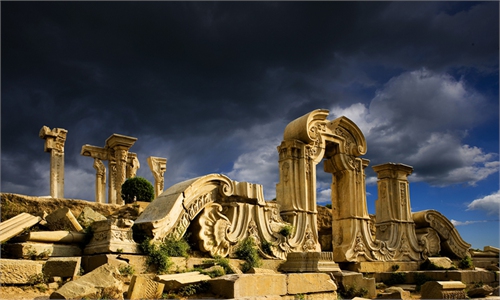ARTS / CULTURE & LEISURE
Unauthorized construction at Yuanmingyuan Ruins Park evokes ire of Chinese netizens, who call to maintain park’s current state as “mark of national shame.”

The Yuanmingyuan Park in Beijing was burned and ransacked by British and French troops, while the Anglo-French expedition force invaded China during the Second Opium War in 1860. Photo: VCG
The news that an unauthorized construction project at Beijing's Yuanmingyuan, or Old Summer Palace, has been order to be stopped began trending on Chinese social media on Thursday after China's cultural relics authority released a report on law enforcement patrols of national cultural relics in 2020. The news sparked anger among netizens, many of whom said that the park, which was razed to the ground by Anglo-French forces in 1860, should remain in its current destroyed state as a reminder of China's "national shame."According to the report that China's National Cultural Heritage Administration released on Wednesday, in July 2020 some residents near the part reported that the management office of the park in Beijing's Haidian District began a construction project at the cultural site without authorization. The administration has ordered that construction stop and that the management should restore the site to its pre-construction state.
The hashtag for the news had earned 130 million views on China's Twitter-like Sina Weibo as of Thursday afternoon. Many Chinese netizens expressed their anger and questioned the reasons for the construction project.
"How dare they change something at the site without authorization? The Yuanmingyuan is one of our cultural relics, and is also a witness to our history as well as the evil acts of the Anglo-French Allied Forces. We should maintain its current state as warning and a mark of our national shame," one Chinese netizen commented on Sina Weibo.
However, one insider working at Yuanmingyuan told the Global Times that there may be some misunderstanding concerning the statement and another employee at the Beijing Municipal Administration of Cultural Heritage who wished to be anonymous told the Global Times on Thursday that the case is under investigation.
China's National Cultural Heritage Administration once stated in 2020 that Yuanmingyuan should not be restored as there is a lack of "archaeological and historical documentation" to act as a basis for restoration efforts and that any restoration would "change the historical status quo of the Yuanmingyuan's destruction by foreign powers."
It noted, however, that it does support the restoration of the cultural site to its former glory through digital means.
The report also listed many other cultural sites such as the Great Wall, the Ming Tombs and the Grand Canal that have encountered some legal issues.
It also revealed that more than 31,000 lost or stolen cultural relics were retrieved in China in 2020. Meanwhile, under joint cooperation with the Ministry of Public Security, 2,134 cases related to the theft and illegal excavation of underground relics were solved and 2,435 suspects were captured in 2020.
Major cases were solved in North China's Shanxi Province, East China's Anhui Province, Northwest China's Shaanxi Province, Gansu Province and the Xinjiang Uygur autonomous region.
The number of cultural relic cases reported in 2020 went down by about 20 percent year-on-year.
The administration also announced that it was implementing a new method for relic supervision using cutting-edge remote sensor technologies in 2021.




